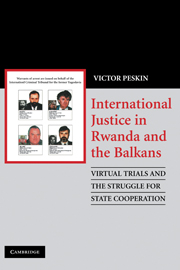 International Justice in Rwanda and the Balkans
International Justice in Rwanda and the Balkans Book contents
- Frontmatter
- Contents
- Maps and Timelines
- Acknowledgments
- Permissions
- Note on Pronunciation
- MAP 1 Map of the Former Yugoslavia
- MAP 2 Map of Rwanda
- PART I INTRODUCTION
- PART II THE BALKANS: STRATEGIES OF NON-COMPLIANCE AND INSTRUMENTS OF PRESSURE
- PART III RWANDA: VIRTUAL TRIALS, INTERNATIONAL JUSTICE, AND THE POLITICS OF SHAME
- 6 The Struggle to Create the International Criminal Tribunal for Rwanda
- 7 “Trials of Cooperation” and the Battles for Karamira and Barayagwiza
- 8 Investigating Rwandan Patriotic Front Atrocities and the Politics of Bearing Witness
- 9 Victor's Justice Revisited: The Prosecutor v. Kagame
- PART IV CONCLUSION
- Bibliography
- Index
9 - Victor's Justice Revisited: The Prosecutor v. Kagame
Published online by Cambridge University Press: 05 September 2012
- Frontmatter
- Contents
- Maps and Timelines
- Acknowledgments
- Permissions
- Note on Pronunciation
- MAP 1 Map of the Former Yugoslavia
- MAP 2 Map of Rwanda
- PART I INTRODUCTION
- PART II THE BALKANS: STRATEGIES OF NON-COMPLIANCE AND INSTRUMENTS OF PRESSURE
- PART III RWANDA: VIRTUAL TRIALS, INTERNATIONAL JUSTICE, AND THE POLITICS OF SHAME
- 6 The Struggle to Create the International Criminal Tribunal for Rwanda
- 7 “Trials of Cooperation” and the Battles for Karamira and Barayagwiza
- 8 Investigating Rwandan Patriotic Front Atrocities and the Politics of Bearing Witness
- 9 Victor's Justice Revisited: The Prosecutor v. Kagame
- PART IV CONCLUSION
- Bibliography
- Index
Summary
Introduction
The contentious relationship between the International Criminal Tribunal for Rwanda (ICTR) and the Tutsi-led Rwandan government came to a head when Rwanda blocked Chief Prosecutor Carla Del Ponte's imminent indictments of Rwandan Patriotic Front (RPF) military officers. The ability of the government to avoid significant international censure as it thwarted Del Ponte undermined a foundational principle upon which the contemporary international war crimes tribunals was founded: that individuals from all sides of an armed conflict suspected of committing serious violations of international humanitarian law should not enjoy immunity from prosecution. This chapter focuses on the period beginning in April 2002 and ending in August 2003 – from Del Ponte's first public criticism of Rwandan non-cooperation with her probe of RPF atrocities, to the government's successful move to have the Security Council dismiss her as chief prosecutor of the ICTR. The chapter concludes with an analysis of the way Del Ponte's replacement, Hassan Jallow, has approached the question of RPF atrocities and why, after nearly four years, he has refrained from indicting RPF suspects.
The tacit backing of Rwanda's closest Western allies – the United States and Great Britain – played a crucial role in enabling the Kigali government to outmaneuver Del Ponte's efforts to prosecute RPF officers for war crimes against Hutu civilians. The role of the West during this period underscores a recurring theme in this study: without strong and consistent international political support, tribunals will rarely succeed in prodding recalcitrant states to cooperate in the prosecution of members of their own national or ethnic groups.
- Type
- Chapter
- Information
- International Justice in Rwanda and the BalkansVirtual Trials and the Struggle for State Cooperation, pp. 207 - 232Publisher: Cambridge University PressPrint publication year: 2008
